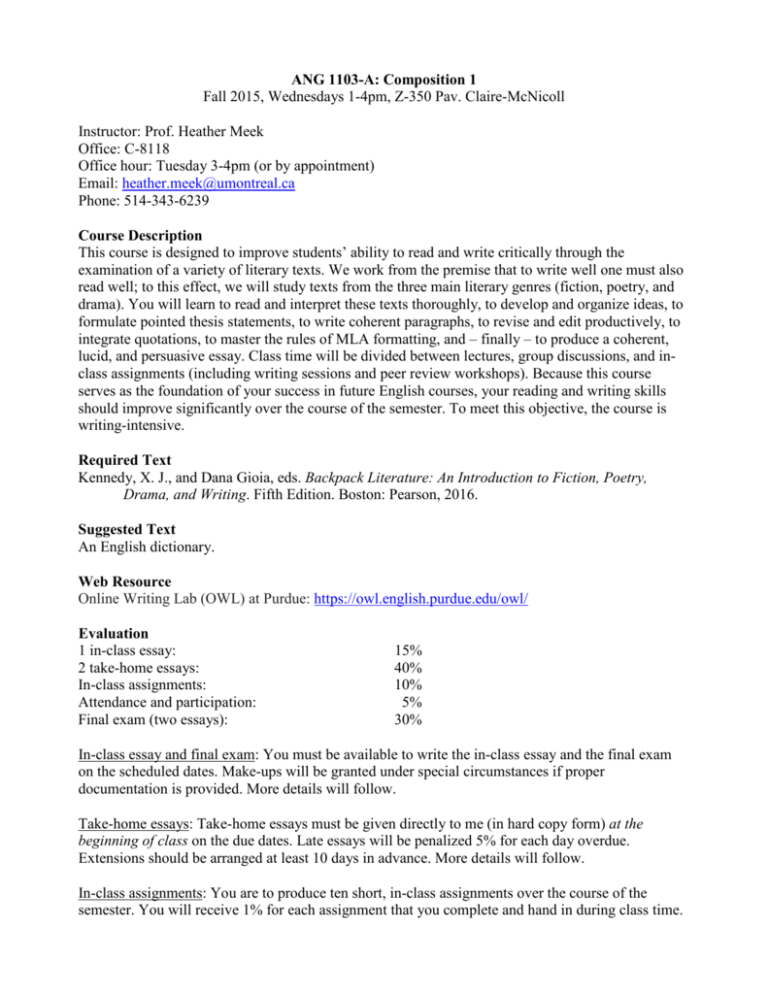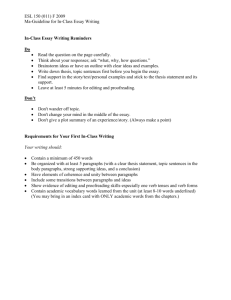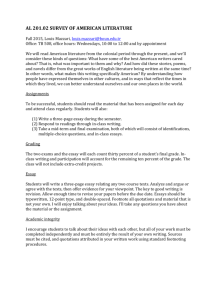University of Regina
advertisement

ANG 1103-A: Composition 1 Fall 2015, Wednesdays 1-4pm, Z-350 Pav. Claire-McNicoll Instructor: Prof. Heather Meek Office: C-8118 Office hour: Tuesday 3-4pm (or by appointment) Email: heather.meek@umontreal.ca Phone: 514-343-6239 Course Description This course is designed to improve students’ ability to read and write critically through the examination of a variety of literary texts. We work from the premise that to write well one must also read well; to this effect, we will study texts from the three main literary genres (fiction, poetry, and drama). You will learn to read and interpret these texts thoroughly, to develop and organize ideas, to formulate pointed thesis statements, to write coherent paragraphs, to revise and edit productively, to integrate quotations, to master the rules of MLA formatting, and – finally – to produce a coherent, lucid, and persuasive essay. Class time will be divided between lectures, group discussions, and inclass assignments (including writing sessions and peer review workshops). Because this course serves as the foundation of your success in future English courses, your reading and writing skills should improve significantly over the course of the semester. To meet this objective, the course is writing-intensive. Required Text Kennedy, X. J., and Dana Gioia, eds. Backpack Literature: An Introduction to Fiction, Poetry, Drama, and Writing. Fifth Edition. Boston: Pearson, 2016. Suggested Text An English dictionary. Web Resource Online Writing Lab (OWL) at Purdue: https://owl.english.purdue.edu/owl/ Evaluation 1 in-class essay: 2 take-home essays: In-class assignments: Attendance and participation: Final exam (two essays): 15% 40% 10% 5% 30% In-class essay and final exam: You must be available to write the in-class essay and the final exam on the scheduled dates. Make-ups will be granted under special circumstances if proper documentation is provided. More details will follow. Take-home essays: Take-home essays must be given directly to me (in hard copy form) at the beginning of class on the due dates. Late essays will be penalized 5% for each day overdue. Extensions should be arranged at least 10 days in advance. More details will follow. In-class assignments: You are to produce ten short, in-class assignments over the course of the semester. You will receive 1% for each assignment that you complete and hand in during class time. Attendance and participation: It is expected that you attend all classes and that you come prepared to share your ideas on the relevant topics and readings. Electronic Devices Cellphones, laptops, and tablets are prohibited in the classroom; they must be turned off and hidden from view. If for some reason it is crucial that you use one of these devices during class time, please arrange to meet with me. Plagiarism Students are warned not to plagiarize. Plagiarism is considered a serious academic offence which may lead to a mark of ‘F’ on an assignment or a course, or even suspension or expulsion from the University. Please note that I am required to report all cases of plagiarism to the Dean. See http://www.integrite.umontreal.ca for more on the definitions and consequences of plagiarism. If you are uncertain what plagiarism is, please arrange to meet with me. Class Schedule WEEK 1 – September 2 Introduction to the course WEEK 2 – September 9 Theodore Roethke, “My Papa’s Waltz” (380) Jamaica Kincaid, “Girl” (56-58) “Writing about Literature” (1089-97) In-class assignment: Active reading (previewing, highlighting, and annotating), generating ideas, prewriting, and outlining WEEK 3 – September 16 “Reading a Story” (5-6) “Point of View” (28-32, 58-60) “The Tell-Tale Heart” (40-45) “Writing about Literature” (1098-1104) In-class assignment: Developing an argument and drafting an essay WEEK 4 – September 23 “Symbol” (203-06, 244-45) Shirley Jackson, “The Lottery” (235-43) In-class assignment: Writing topic sentences and paragraphs WEEK 5 – September 30 “Character” (61-63, 98-100) Raymond Carver, “Cathedral” (85-98) In-class essay (15%) WEEK 6 – October 7 Flannery O’Connor, “A Good Man is Hard to Find” (336-49) “Writing about Literature: Revising your Argument” (1105-1113) In-class assignment: Begin (or continue) drafting take-home essay #1 2 WEEK 7 – October 14 “Setting” (101-04, 145-46) Charlotte Perkins Gilman, “The Yellow Wallpaper” (215-29) “Document Sources Using MLA Style” (1155-67) In-class assignment: Peer review of take-home essay #1 STUDY BREAK WEEK 8 – October 28 Take-home essay #1 due (20%) “Reading a Poem” (363-69) “Listening to a Voice: Tone” (379, 399-401) Langston Hughes, “Theme for English B” (389-90) Wilfred Owen, “Dulce et Decorum Est” (398-99) WEEK 9 – November 4 “Dramatic Poetry, The Dramatic Monologue” (372-73) Robert Browning, “My Last Duchess” (373-75) “Dramatic Irony” (393) Sharon Olds, “Rites of Passage” (395) In-class assignment: Integrating quotations and documenting sources WEEK 10 – November 11 “Closed Form” (493-94, 501) William Shakespeare, “Sonnet 130” (614) Sherman Alexie, “The Facebook Sonnet” (504) Dylan Thomas, “Do not go gentle into that goodnight” (506) In-class assignment: Generating titles WEEK 11 – November 18 “Myth and Narrative” (539-40, 551-52, 556-57) Anne Sexton, “Cinderella” (553-55) In-class assignment: Begin or continue drafting take-home essay #2 WEEK 12 – November 25 “Reading a Play” (631-32) Susan Glaspell, “Trifles” (633-46) “Analyzing Trifles” (646-53) In-class assignment: Peer review of take-home essay #1 WEEK 13 – December 2 Take-home essay #2 due (20%) Review for final exam In-class assignment: Exam-writing strategies WEEK 14 – December 9 Final exam (30%) B-3280 Pav. 3200 Jean-Brillant 3






